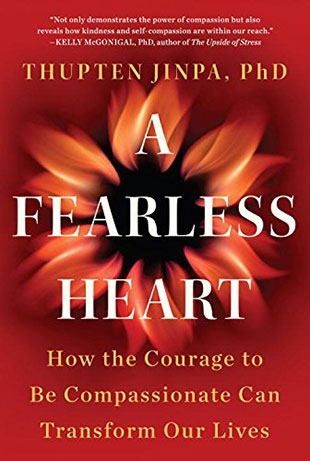Thupten Jinpa is a former monk who holds a PhD from Cambridge University and has been the principal English translator for His Holiness the Dali Lama for nearly 30 years. He is an adjunct professor of religious studies at McGill University and chairman of the Mind and Life Institute, which is dedicated to promoting dialogues and collaborations between the sciences and contemplative knowledge, especially Buddhism.
A Fearless Heart is based on a landmark Compassion Project training Jinpa helped create at the Stanford School of Medicine. According to the author, compassion is the best kept secret of happiness. We are born to connect and to mystically bond with others. The spiritual practice of compassion has the following benefits: it receives kindness, leads to the helper’s high, contains more purpose and less stress, cures loneliness, and hangs in there with patience.
Compassion practice also holds within its embrace compassion for ourselves. This enables us to renew our resources, set reasonable goals, learn from our experience, and feel less alone. But make no mistake about this: the aim of the Compassion Project is not only to bring attention to compassion as a central value or to make us more empathetic toward others. The bold and ambitious aim is:
"to offer a systematic practice to make compassion the fundamental principle governing all aspects of our life: from how we see ourselves and interact with others, to bringing up our children, to engaging with the world around us."
Jinpa covers areas needing change: our outlook, our awareness, our capacity for empathy, and our behavior. He examines ways to cultivate compassion by turning intention into motivation, keeping on track with focused awareness, focusing the mind, and strengthening meta-awareness. A section we found most helpful covers getting unstuck -- escaping the prison of excessive self-involvement. The process of caring for ourselves (embracing our common humanity, expanding the circle of concern, and priming our heart through tonglen) is important to cultivating this spiritual practice.
The final section of this book offers "A New Way of Being" where compassion makes us healthy and strong, promotes a resilient mind, and anchors our personal ethics. Jinpa concludes with suggestions for transforming our healthcare system, educating our children, creating a more caring workplace and economics, and fashioning a more just and loving society.
